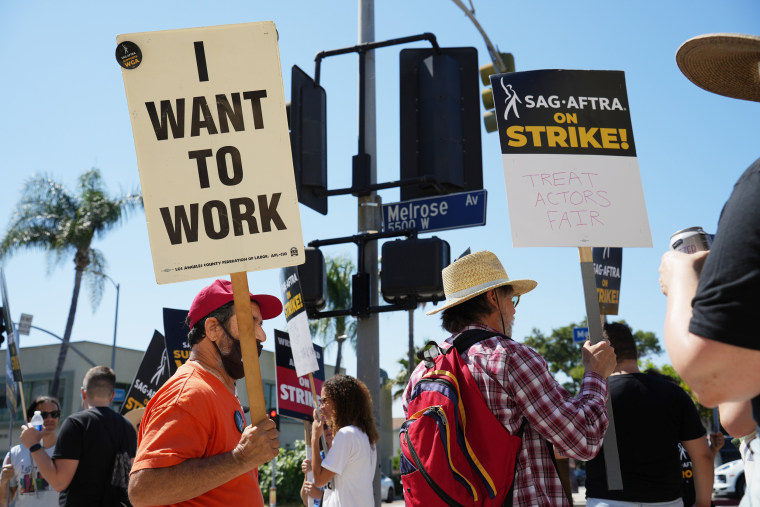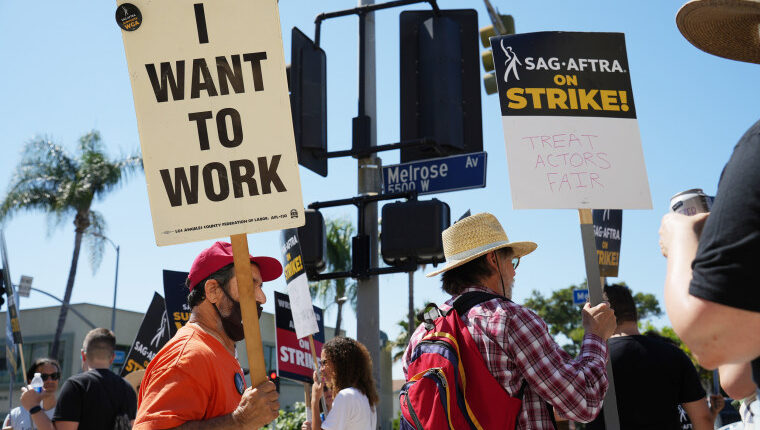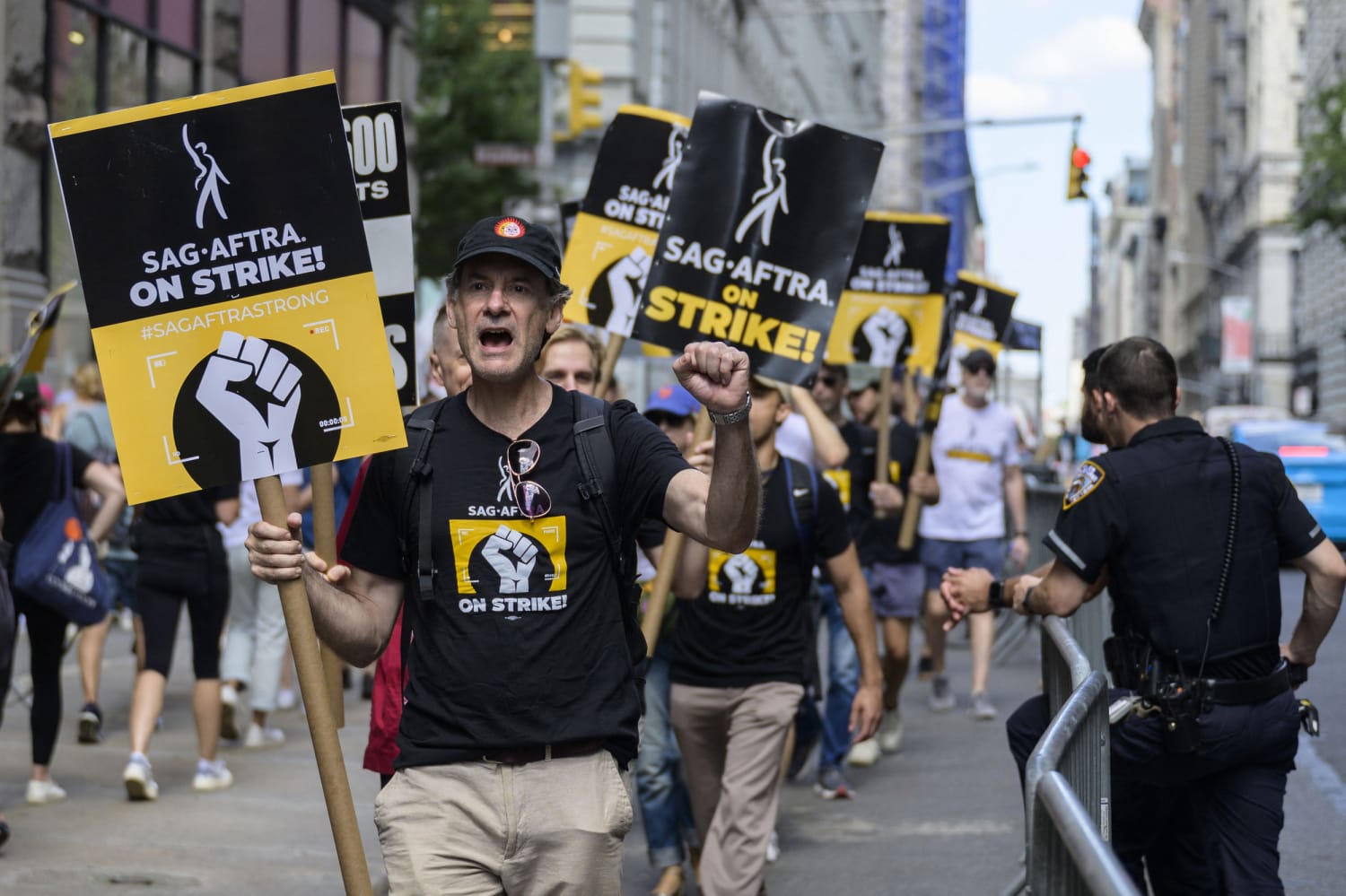In recent weeks, entertainment industry workers have expressed dismay on social media over a quote published by the trade publication Deadline that was attributed to an unnamed studio executive: “The endgame is to allow things to drag on until union members start losing their apartments and losing their houses,” the executive was quoted as saying.
In a statement Tuesday, the AMPTP said the leading entertainment companies “remain committed to finding a path to mutually beneficial deals with both Unions and returning the industry to work.”
The writers and actors on strike are seeking higher base compensation, stricter safeguards against artificial intelligence and other changes to the status quo.
“We’re not enjoying this. We’re not doing this because we make a s—load of money and we want more money. We’re doing this because AI is a huge issue, because people might lose work,” said Paul Varacchi, a SAG-AFTRA stunt performer and fight coordinator whose television credits include “The Good Fight” and “Daredevil.”
Varacchi, 45, feels like he has been taking it on the chin all year. He used to supplement his stunt work with a job at Disney on a team that oversees Covid health and safety protocols on sets. He was laid off in early June amid companywide cuts.
Then came the strike, which he feels has put his performance career “on pause” indefinitely. “I’ve kind of lost everything, including my side hustle,” he said, referring to his former job at Disney. He and his wife have a newborn daughter, and their household expenses are on the rise at a particularly inopportune time.
Dana Morgan, a SAG-AFTRA stunt performer and actor who has worked on TV shows like “Dead Ringers” and “Madam Secretary,” said she and her husband are dipping into their savings to survive. He got a job at a restaurant to help pay the bills. She is having a difficult time finding remote work. She’s on a waitlist for a gig with Uber Eats.
The strike exacted a cost on Morgan’s side hustle, too. In addition to her on-screen career, she acts as a liaison between physical locations and productions hoping to shoot there. But because the vast majority of film and television projects are on hold, so is that secondary source of income.
Morgan, who lives in Staten Island, expects she and her husband will have all but depleted their savings by September.
The SAG-AFTRA Foundation, a nonprofit organization that supports actors during crises, processed more than 30 times its typical number of applications for emergency aid last week, according to a statement from the organization’s president, Emmy-winning actor Courtney B. Vance.
“Our Emergency Financial Assistance Program is here to ensure that performers in need don’t lose their homes, have the ability to pay for utilities, buy food for their families, purchase life-saving prescriptions, cover medical bills and more,” Vance said. “It’s a massive challenge, but we’re determined to meet this moment.”

The foundation raised more than $15 million in July thanks to donations from George Clooney, Leonardo DiCaprio, Dwayne Johnson, Julia Roberts, Meryl Streep, Oprah Winfrey and other A-list stars.
“I remember my days as a waiter, cleaner, typist, even my time on the unemployment line,” Streep said in a statement. “In this strike action, I am lucky to be able to support those who will struggle in a long action to sustain against Goliath.”
Corey Dashaun, a third-year WGA member who was credited on the Peacock series “One of Us Is Lying,” described the last few months as an emotional “roller coaster” that has tested the resilience of early-career screenwriters — especially Black and queer creators like himself. (Peacock and NBC News are both owned by NBCUniversal.)
The strikes have upended the entertainment business “right as we’re finally getting opportunities to get in the door,” said Dashaun, 34, who lives in Los Angeles. “It’s demoralizing to try to build a successful career right now.”
Dashaun has managed to live off a “nest egg” of earnings he generated from writing jobs before the strike, he said, but “I by no means feel comfortable that my savings will last unless we go back to work soon.”
In interviews, WGA and SAG-AFTRA members were frank about the financial toll of the strike but firm in their resolve to keep fighting. It’s a sentiment that has been echoed by many of the industry’s “below-the-line” workers, a category that includes hairdressers, costume designers, camera operators, carpenters and other professionals represented by different unions, such as the International Alliance of Theatrical Stage Employees.
Morgan said the strike “absolutely needed to happen,” in part because her SAG-AFTRA peers are forcefully pushing back against what she describes as a systemic problem in the business: more work for less pay and an increasingly smaller slice of corporate profits.
“The pain that we are suffering financially is a short-term sacrifice for something that’s going to help us in the long run,”she said. “We’ll survive.”
Source: | This article originally belongs to Nbcnews.com










